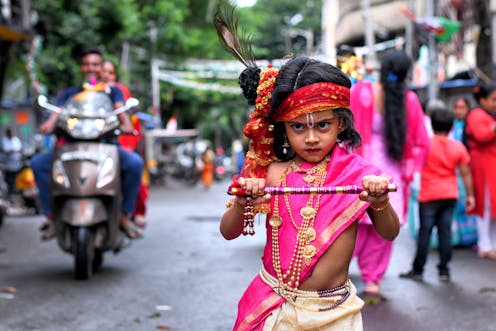
A child dressed up as Lord Krishna poses for a photo during the Krishna Janmashtami festival in Kolkata, India. Avishek Das/SOPA Images/LightRocket via Getty Images
Many Hindus around the world will celebrate Krishna Janmashtami, the birthday of the Hindu god Krishna, on Sept. 6. The birth celebrations occur on the eighth day after the full moon in the month of Bhadrapada, or during August-September; in some parts of southern India the celebrations are held during the fifth lunar month of Shravana, which is in July-August.
In Sanskrit, Krishna means “dark” or “black,” and like the deity Vishnu with whom he is associated, Krishna is often depicted as dark-skinned. He is identified as the eighth avatar, or incarnation, of the deity Vishnu in many texts, while other sources identify Krishna as the highest divine being. He is especially loved for his divine attributes of compassion, protection and friendship.
The observance of Krishna Janmashtami has moved far beyond its place of origin in Krishna’s homeland of Vrindaban, in north-central India, where Krishna is said to have been raised. Today, in the global community of about 1.2 billion Hindus, Krishna Janmashtami is considered an important holiday among all lineages and traditions.
Krishna’s birth
The story of Krishna’s divine birth is told in households across South Asia on Krishna Janmashtami. According to lore, Krishna’s uncle, Kamsa, the king of Mathura, a town in northern India, heard a celestial voice prophesying in his court that his downfall would come at the hands of the eighth child born to his cousin Devaki.
In an effort to preserve his reign, Kamsa imprisoned Devaki and her spouse, Vasudeva, and killed each child born to them. According to a sacred Hindu text called the “Bhagavata Purana,” when the eighth child, Krishna, was born, the gates of the prison opened miraculously and a divine voice instructed Vasudeva to ferry Krishna across the Yamuna River. A torrential rain caused the Yamuna to flood, but the river rose only to Krishna’s feet; Vasudeva delivered the divine infant unharmed to his cousin Nanda and his wife Yashoda in the region in northern India known as Braj.
To quell Kamsa’s suspicions, the gods replaced Krishna with Yashoda’s daughter in the prison. When Kamsa’s guards attempted to kill her, she transformed into the goddess Yogamaya and reminded Kamsa of his inescapable fate and vanished from the prison cell.
The exploits of Krishna as a child are especially celebrated during the holiday. Devotees commemorate the love of Yashoda for Krishna and recall his playful pranks in songs and dances.
Krishna in the Bhagavad Gita
While many around the world may not know much about Hinduism, or about Krishna, they might still recognize him from his role in the “Bhagavad Gita,” or “The Song of the Lord,” a section in the world’s lengthiest epic poem, the “Mahabharata.”
Often dubbed the “Bible of Hinduism” because of its immense popularity, the Bhagavad Gita is chanted in homes and temples in the days leading up to Krishna Janmashtami.
A scene from Hindu mythology featuring the god Krishna with Prince Arjuna on a chariot heading into war.
Pictures From History/Universal Images Group via Getty Images
In the Gita, Krishna, disguised as a charioteer, advises the warrior Arjuna, who is heartbroken that he has to fight his own cousins, about his duty on the battlefield. In its 18 chapters, Krishna counsels Arjuna about three paths, or “margas,” to realize salvation, or “moksha,” from the eternal cycle of suffering and rebirth.
Festivities on the day
On the first day of the celebration of Krishna Janmashtami, activities culminate in a “Krishna puja,” a devotional form of worship using a form or an image, such as an idol of Krishna. After midnight, statues of Krishna are bathed in milk and water, dressed in new clothes and venerated in homes and temples. Devotees enjoy a celebratory meal after breaking the daylong fast.
In addition to fasting during the holiday, Krishna’s devotees sing songs called “bhajans,” or “kirtans,” dedicated to Krishna, reenact episodes from mythology about his life, known as “Krishna Lilas,” and perform folk dances, or “garbhas.”
Young Hindu devotees break a dahi-handi, or curd pot, suspended from a rope.
Imtiyaz Shaikh/Anadolu Agency via Getty Images
In northern India, Krishna Janmashtami is followed the next day by a raucous and spirited event called “Dahi Handi,” loosely translated as “curds in an earthen pot.” Young men and boys imitate the childish pranks of “Makhan Chor,” an epithet given to Krishna in his beloved form during his childhood as a “butter thief.” Folklore is full of stories about Krishna and his childhood friends stealing sweetened butter from the village gopis, or cow herdesses.
To engage in the reenactment, a pot of sweetened butter and curds is suspended in midair, while teenage boys dressed as cowherds form human pyramids, climbing on each other’s backs to reach and break the pot, sharing the sweet yogurt within. A 2012 group from Mumbai holds the world’s record for forming a 13-meter tall Dahi Handi pyramid.
Beyond South Asia
Krishna devotion spread in the United States with the founding of the International Society for Krishna Consciousness, or ISKCON, in New York City in 1965. Since then it has become a global movement, with the devotees being referred to as “Hare Krishnas” due to their devotional chants to Krishna.
On Krishna Janmashtami, the devotees observe the birthday of the founder, A.C. Bhaktivedanta Swami Prabhupada, as his “Appearance Day,” believing him to be another incarnation of Krishna.
Krishna is believed to be eternally present. In the Bhagavad Gita, Krishna reminds Arjuna that “he is not far from the soul – in fact he is closer than the closest.” For many, the commemoration of Krishna’s birth is a time to remember God’s abiding love and closeness, as well as to express gratitude for the freely given gift of grace.
Robert J. Stephens does not work for, consult, own shares in or receive funding from any company or organization that would benefit from this article, and has disclosed no relevant affiliations beyond their academic appointment.
Advertisement

Advertisement
Contact Us
If you would like to place dofollow backlinks in our website or paid content reach out to info@qhubonews.com











